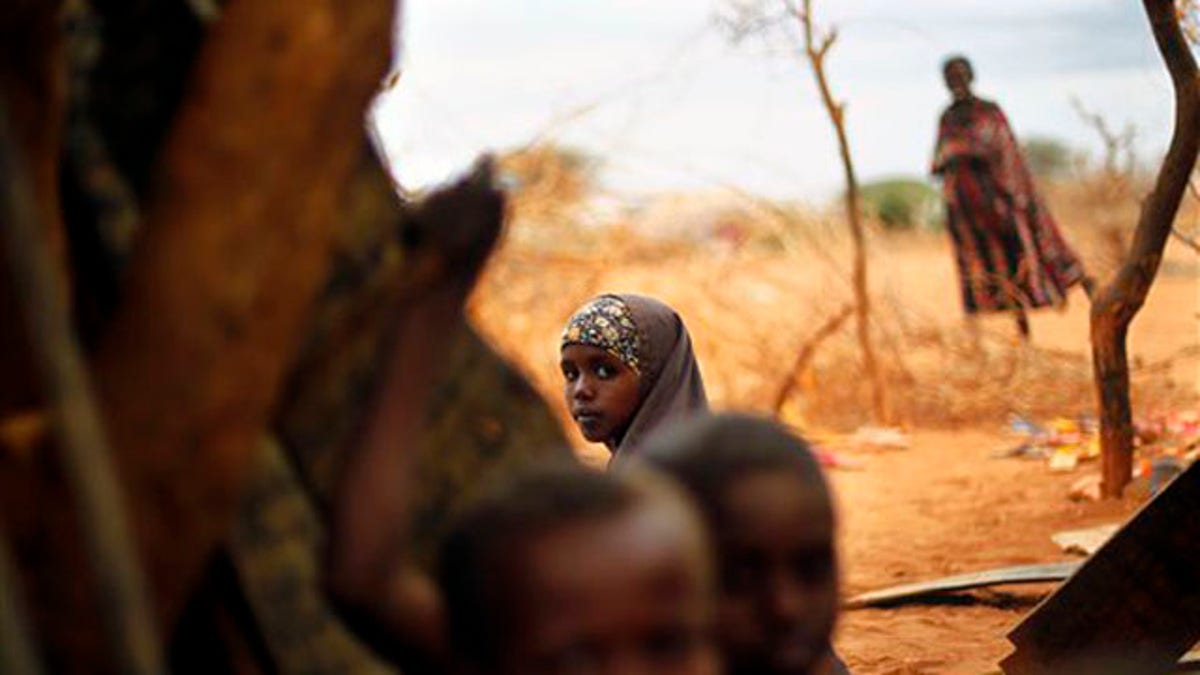
Tuesday: A Somali refugee sits at an outdoor madrasa at the Ifo camp outside Dadaab, Eastern Kenya. (AP)
The United States is stepping up aid to the drought-stricken Horn of Africa in spite of deep deficit problems, while the countries that have snickered on the sidelines about America's cash crunch, specifically Russia and China, are giving pennies on the dollar to what the U.S. has committed.
The United States has approved $565 million in humanitarian aid for the region so far this year, according to the Obama administration. Included in that is the $105 million announced by the White House Monday.
"Our concern about this issue is profound, and we want to continue to lead, as we have, in providing the assistance necessary to ward off starvation," White House Press Secretary Jay Carney said, noting that Jill Biden, wife of Vice President Biden, traveled to Africa to promote the "same cause."
The U.S. is the largest contributor to the global pool of donations meant to help millions of starving people in East Africa. The famine has hit Somalia hardest, though the humanitarian crisis extends to Ethiopia, Kenya and surrounding countries. According to the United Nations, nearly $2.5 billion is needed to combat the crisis, with not quite half of that raised so far. An estimated 12 million people are in need of help.
But while the United States and several other cash-strapped nations together donate hundreds of millions of dollars, a number of other countries are holding back -- particularly those who ridiculed the U.S. over its debt problems.
According to the latest statistics from the Financial Tracking Service, which records humanitarian aid around the world, Russia has so far put up $1 million and China has pledged $14 million. Venezuela, whose president Hugo Chavez is undergoing cancer treatments, is not on the list of donors despite its market being up 43 percent this year.
By comparison, Japan -- which is still reeling from a combination earthquake-tsunami-nuclear crisis -- has put up $96 million, according to FTS. The United Kingdom, the second largest national donor after the U.S., has pledged or contributed almost $200 million so far.
While Russia and China hold on to their bucks, they're not shy about dispensing financial advice to the United States.
Russian Prime Minister Vladimir Putin was recently quoted saying the United States was "acting as a parasite" by not living within its means and "shifting the weight of responsibility" on others.
After U.S. credit was downgraded by Standard & Poor's Friday, Chinese state media scolded the U.S. and said its "good old days" of massive borrowing are over.
But when it comes to humanitarian aid, the countries are under pressure to do more.
House Democratic Leader Nancy Pelosi said in a statement last week that other nations need to contribute their share to crises like the one in Africa.
"The drought and famine in the Horn of Africa is a challenge to the conscience of leaders around the world, and the United States and the international community must do more," she said, following a meeting alongside other lawmakers with USAID Administrator Raj Shah. "We can begin by providing financial and vocal support to organizations taking risks in getting food, health services, and humanitarian assistance to the most vulnerable; other members of the international community, including China and Saudi Arabia, must also step up their efforts."
According to the donor tracking service, Saudi Arabia has committed $60 million to famine relief in the region.
Following Pelosi's statement, China's foreign ministry reportedly said over the weekend that it was paying "close attention" to the drought.
The donations, including millions from the U.S.-backed World Bank, will go to an array of programs and organizations. U.N. agencies like the World Food Program and U.N. Food & Agriculture Organization are leading the charge to raise and deliver aid to the region -- a task made more difficult by the heavy presence of armed militants in Somalia.




